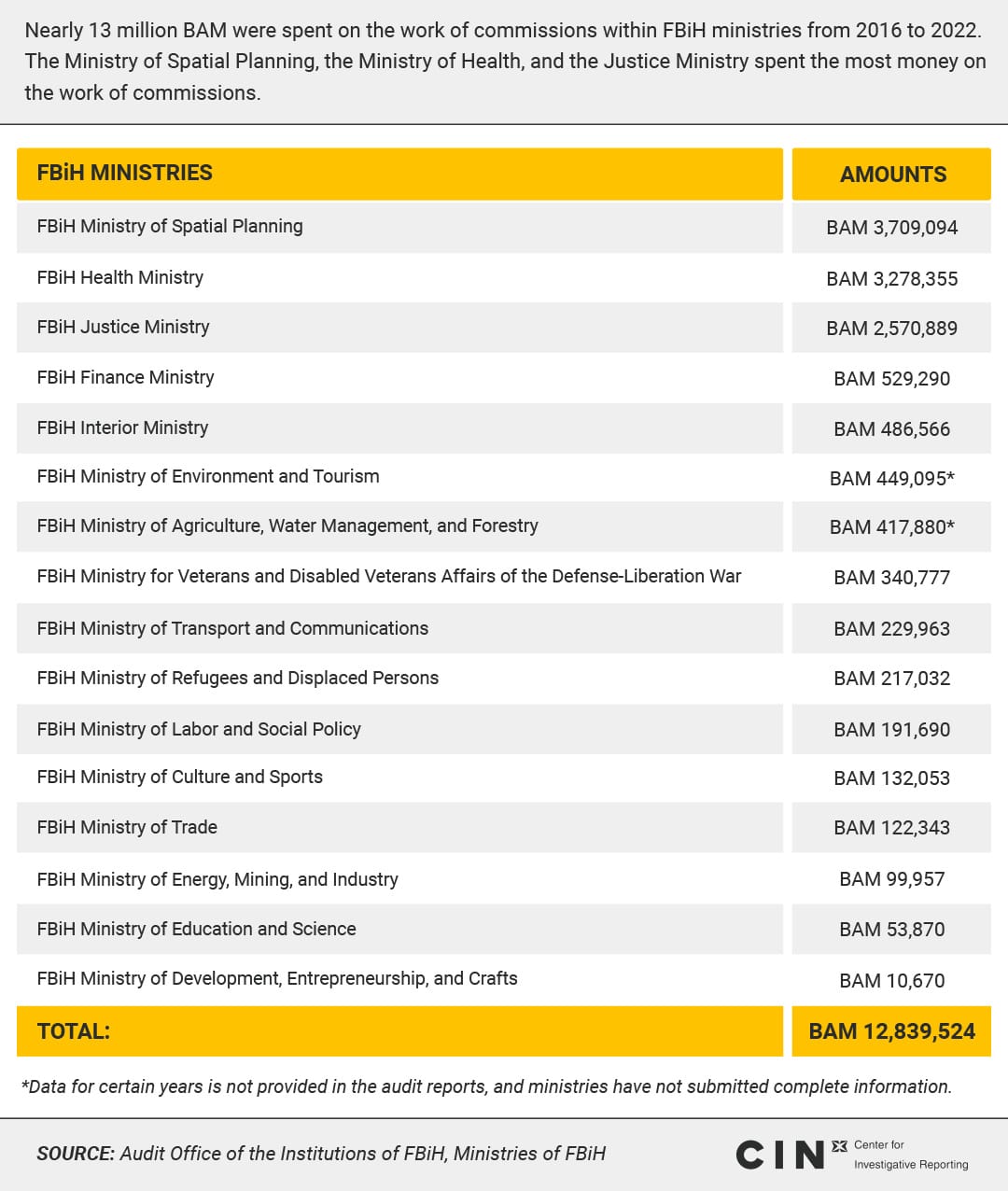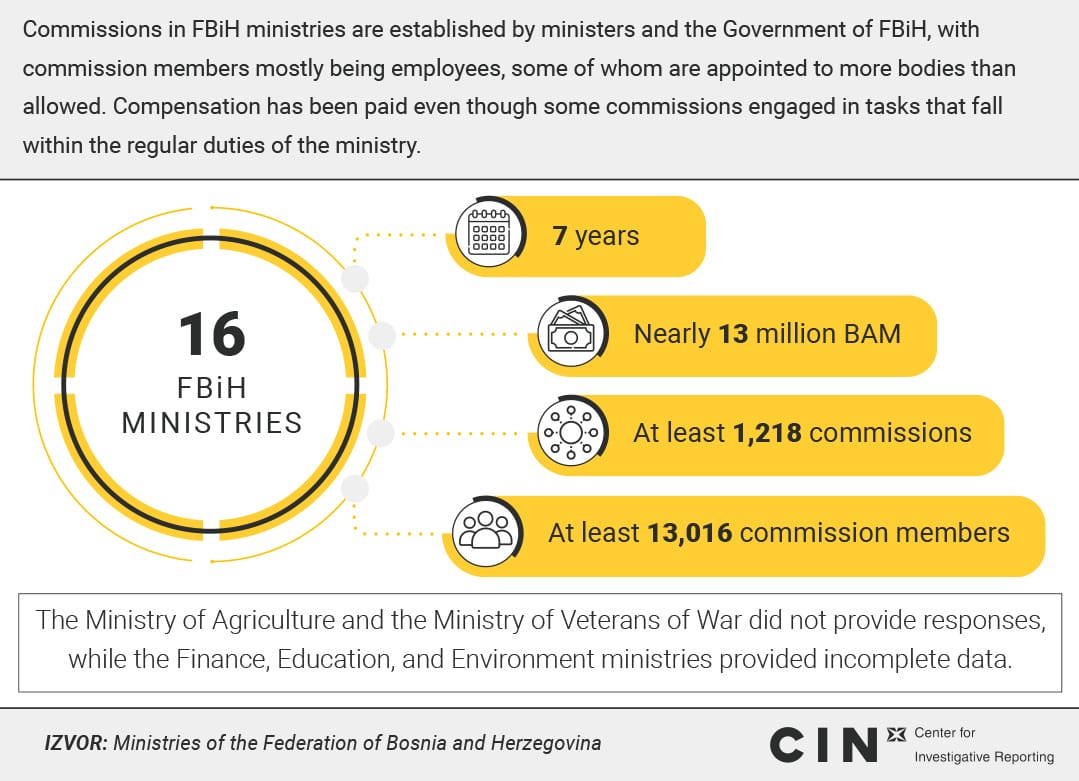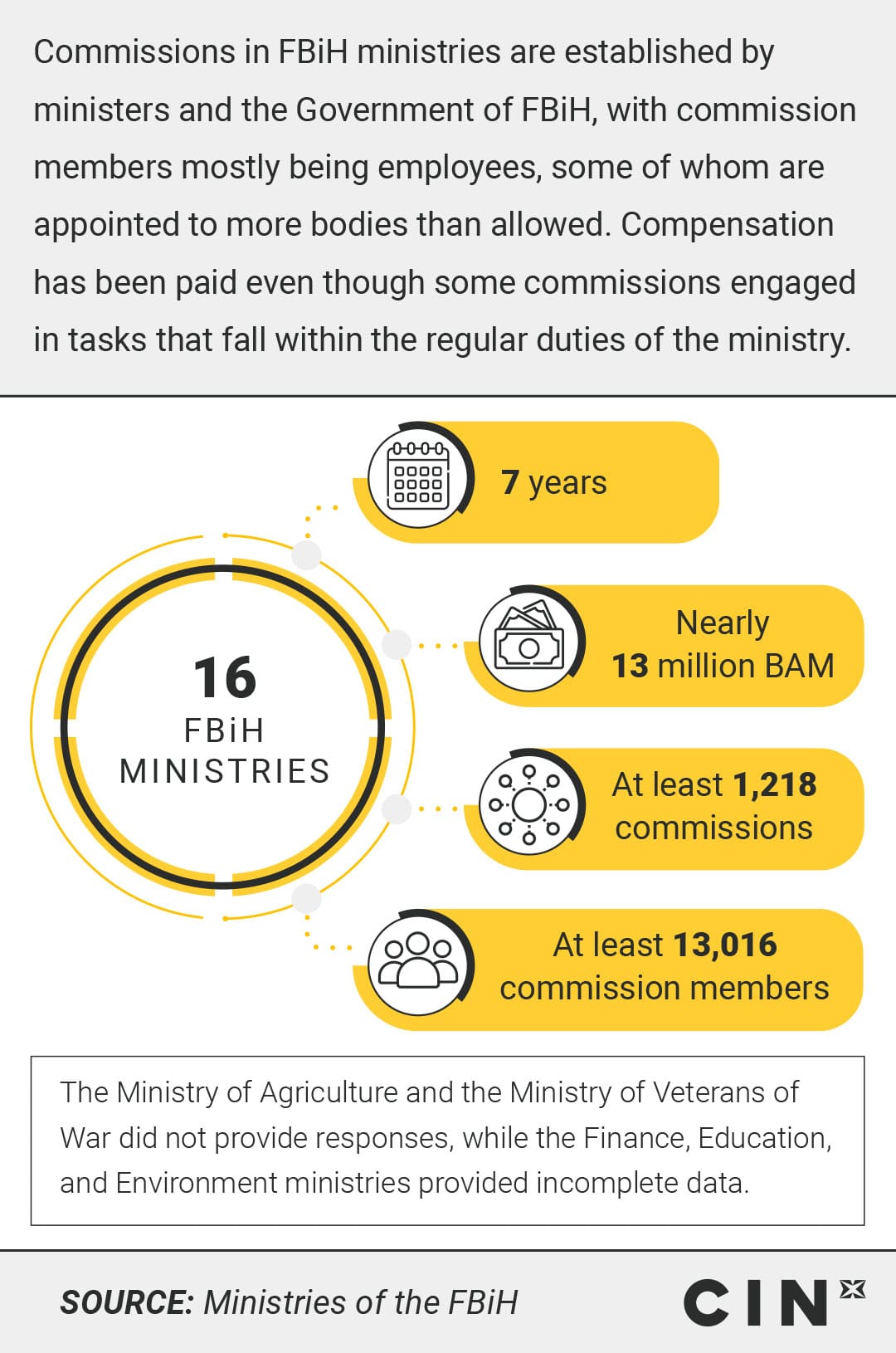Sixteen ministries in the Federation of Bosnia and Herzegovina spent 12.8 million BAM to compensate members of commissions and working bodies from 2016 to 2022. The funds were distributed among 2,026 individuals, with their earnings ranging from a few hundred to over a hundred thousand marks.
The FBiH government and ministers established these commissions to handle various tasks, from leasing photocopiers, taking inventories of car tires, enacting regulations to conducting professional exams. The majority of commission members were ministry employees who did the commission-related work even during their regular business hours but received additional compensation for their commission-related tasks. Some individuals served in more commissions than allowed.
The Ministry of Spatial Planning, the Ministry of Health, and the Justice Ministry spent the most money, a total of 9.5 million BAM, three times more than all other ministries combined. The monthly earnings of some commission members exceeded the annual salary of an average paid worker in the Federation of Bosnia and Herzegovina.
Among the commission members was Mato Jozić, a former Justice Minister, who appointed himself to ten commissions and working bodies, earning nearly 29,000 marks for his participation.
“To have a former minister working in an expert commission? I do not find it normal”, said in disapproval the former minister of spatial planning of the FBiH, Josip Martić.

Versatile Minister Jozić
Mato Jozić, a legal professional from Orašje and a card-carrying member of the Croat Democratic Union of Bosnia and Herzegovina (HDZBiH), assumed the position of the FBiH Minister of Justice in March 2015, following several years in various roles in the municipality and the Posavina Canton.
In six years, he formed over 60 commissions and working bodies comprising more than 1,200 members, including ministry employees and external experts. They were paid 2.5 million BAM from the budget and fees from candidates taking professional exams.
A portion of the nearly 29,000 BAM went to Minister Jozić, who appointed himself to ten commissions.
Jozić received the highest sum, nearly 15,000 BAM, for his involvement in the Commission for Professional Exam. For his work in the Commission for the Appointment of Permanent Court Interpreters, he received almost 7,400 BAM, while he earned 524 BAM for two sessions in the Commission for the Bar Exam.
Most of the other commissions were primarily mandated with activities that, according to the Law on the Organization of Administration Bodies in FBiH, are the regular duties of the Ministry such as legislative and regulatory drafting.
The minister appoints the commissions and decides on rules and compensations. The FBiH Government did not respond to the question if it was lawful for ministers to appoint themselves to commissions.
Jozić’s advisor, Ivan Ćosić, who received over 22,000 BAM for his engagement during the same period, argues that there is no legal obstacle for a minister to be in a commission. However, he noted that Jozić was only formally present in most commissions and did not actively participate in their work. Nevertheless, he received compensation.
Jozić invoked the Law on the Organization of Administration Bodies in FBiH as the basis for appointing himself to commissions, a move contested by auditors who argue that this law cannot serve as a basis for forming commissions.
Data from most FBiH ministries that responded to CIN’s inquiry suggest that Jozić is the only minister who appointed himself to commissions. His colleagues consider this move senseless and unfair.
“A minister has no place in these working bodies; these are working bodies composed of civil servants. I am not a civil servant. I am someone on whose behalf these working bodies prepare potential decisions”, said former minister of development, entrepreneurship, and crafts, Amir Zukić. The Ministry of Spatial Planning also noted that a minister can only be a member of specific working bodies appointed by the Government of the Federation of BiH.
Although the Law on Conflict of Interest in FBiH is not implemented because the commission tasked with determining such conflicts has never been appointed, lawyer Nedžad Beća, who specialized in administrative law among other areas, believes that Jozić was in a conflict of interest.
“He should be managing and seeing that officials from the Ministry execute all those tasks, not appointing himself to every commission and performing the tasks of that commission, and receiving personal gain therefrom”, Beća argued.
Mato Jozić refused to answer journalists’ questions, stating, “I have no desire or intention to tell or explain anything to anyone.”
Additional Income for Employees
The composition of most commissions is determined by ministers, while some are formed by the Federation Government or the FBiH Civil Service Agency. Commission members receive compensation, the amount of which depends on the regulations under which they are paid: the minimum is 200 BAM per month, provided that at least one session is held after business hours.
The highest fees are in the commissions paid according to special regulations enacted by ministers. Members are often external consultants considered experts in a specific field by the ministries. They are paid by candidates or legal entities, depending on the assigned task.
The Ministries of Spatial Planning, Health, and Justice spent the most money on commissions, ranging from 200,000 to 700,000 BAM annually.
In seven years, the Ministry of Spatial Planning spent 3.7 million BAM. Auditors underline that many commissions were formed to perform regular ministry tasks, such as public procurement, annual inventory, internal controls, development and implementation of integrity plans, selection of transfer beneficiaries, and others. However, the Ministry disputes this, claiming these are specific tasks.
(Non)transparency of the Ministry
CIN had to file a lawsuit against the Federation Ministry of Health to obtain information about commissions. Following the court ruling, instead of providing the information, the Ministry granted journalists occasional, brief access to unconsolidated data, requiring them to perform an institutional task: to protect personal data on documents before taking photographs. Due to the length and scope of the process, data from 2020 to 2022 were collected.
The Audit Office determined that a significant number of employees were serving in more working bodies than allowed, and it could not confirm that the tasks of all commissions were carried out after business hours.
In November 2022, former Minister Josip Martić issued a decision limiting the engagement of civil servants and employees to a maximum of two working bodies simultaneously, except in exceptional cases, but in that case, they are not entitled to compensation for their work.
However, the ministry claimed that this is difficult to achieve because, due to the “specific nature of the job,” they have to form more than 60 commissions annually, and they have few experts available.
As a result, former Secretary of the Ministry of Spatial Planning, Josip Nikolić, earned 144,924 BAM for his involvement in 17 commissions over seven years. He did not respond to journalists’ calls.
Nevertheless, the most money was spent on expert committees and commissions involving external consultants. Construction expert Dario Đonlić earned 162,100 BAM, while electrical engineering expert, Davorin Murgić, earned nearly 138,000 BAM.
The Ministry of Health mostly appointed executives—secretaries, advisors, assistant ministers, and section heads — to commissions, with some earning annual fees exceeding 20,000 BAM. The ministry spent over 766,000 BAM annually on commissions.
In less than three years, the highest earners were Adisa Mehić with 44,000 BAM, Sanja Čustović with 37,130 BAM, and Vesna Alagić with 36,480 BAM. They were members of 127 commissions. Alagić is retired, while Mehić and Čustović declined to discuss the matter.
During public hearings in the Parliament of FBiH, the Secretary of the Ministry of Health, Snježana Bodnaruk, stated that the ministry faces a shortage of staff, and experts are reluctant to apply for positions due to low salaries.
Auditors requested the Ministry to limit the number of commissions in which employees can participate and regulate the compensation for commission work to ensure more rational spending of public funds. However, this has not happened.

Some employees of the Justice Ministry served as members of more commissions than allowed —instead of two, as permitted. The then-employee Sanin Pačariz was a member of up to 10 commissions annually. Over six years, he earned nearly 97,000 BAM.
Former advisor to the Justice Minister, Ivan Ćosić, told CIN that employees can be in more than two commissions annually, provided that commission activities do not overlap. He claims that Pačariz managed to fulfill all his business obligations because he was on commissions for exams, which usually met on weekends. However, according to Ministry data, Pačariz was only in one such commission—the Commission for Determining a List of Experts—where he earned 70,233 BAM. Pačariz declined to speak to CIN.
The Federation Inspector for the Execution of Criminal Sanctions, Mersiha Udovčić, was also very busy, serving on nine commissions annually. She earned 45,988 BAM. She did not respond to journalists’ calls. The Ministry of Justice also refused to comment on this issue, claiming to be too busy with a heavy workload.
The Ministry of Culture and Sports, which spent 132,000 BAM on commissions, stated that employees avoid serving on commissions due to the workload and insufficient compensation. They find commissions formed by the FBiH Government acceptable because they receive compensation regardless of their engagement in meetings:
“The first meeting is about formation, the second meeting is an introduction, the third meeting is about adopting the minutes from the second meeting, where we got to know each other… And each time, we had to pay out 200 BAM,” said the advisor to the former minister, Goran Lulić.













